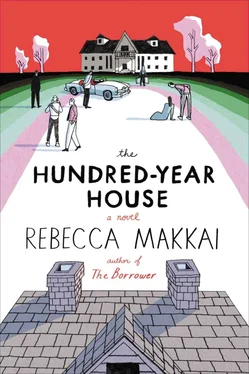—
In April, a call from the detective: Zee was in rural New York. Here was her address. Here was her number. “Look, man,” the guy said, “you could try and get her committed, but I haven’t seen that work out so well. Seemed fine to me.”
This was the afternoon of the same day Miriam filed for divorce from Case. Doug might have driven straight to New York that very night, but he couldn’t leave Miriam alone right then. And moreover: If he was still sure of anything about Zee, it was that contacting her against her will would make things worse. He wanted to believe this was all that kept him back, that fear wasn’t part of it. That a modicum of relief wasn’t part of it.
Miriam wanted sushi, so they went out and Doug let her order for him. She told him, only after he’d swallowed and liked it, that unagi was eel. She told him that when she met Case she’d been so young that she’d taken the regular trappings of his adult life — his job, his car, his drawer full of polo shirts — as signs of maturity and stability. Here was someone who could support her while she made art, a steady rock on which to build her life. Really he’d been anything but. Every year had been worse, every day had been worse — and then they came here, and things got unbearable.
“I think I feel happy tonight,” Miriam said. “Is that awful to say?”
Doug looked at the sushi on his plate. It, too, was tessellated: the wet pink rhombus of salmon, the grains of the rice, the thin edge of seaweed. He thought, I am a different person now. I am someone who eats eel, and this small artist is my best friend. I am someone who has turned the TV room into a file-sorting station, someone who believes fantastical tales of identity theft .
If everything else were still the same, he’d have felt Zee’s absence like a gaping hole. But if he could continue to reconfigure his entire life, there would be no missing place where Zee had been. He thought of Parfitt’s last published poem, “Proteus Wept.” In Greek mythology, the sea god Proteus changed shape to avoid telling mortals the future. Parfitt had twisted it, though: Parfitt’s Proteus changed to avoid remembering the past. It ended with a litany of the forms he took: A lark, a crow, a spoonbill! / This sea-foam, rank and green. Yet Parfitt himself ultimately chose death over reinvention. It was as if he wrote the poem to convince himself of future possibility, and failed. But Doug could do better.
—
He didn’t drive to New York the next day, or the day after. He didn’t call, and then he continued not calling.
What he did instead was ask Sofia to make him an appointment with Gracie. She had written Zee a letter once they had her address, and Zee had written a short note back that, by not expressing anger over car crashes and wheelbarrows, had put Gracie’s mind at ease.
Hidalgo greeted him at the door, relatively sedate. Doug scratched him, just to steal a moment to fortify himself. It had occurred to him that the reason Gracie let him continue to stay in the coach house was that she thought he had far more information than he did. He had to choose his questions well, lest they betray his ignorance. He wasn’t sure how to begin.
But, at the kitchen table, Gracie spoke first.
“Douglas, I’ve come to a place of peace,” she said. “Either my daughter is crazy, or I raised her wrong, but I don’t believe this was your fault.”
He said, “I really didn’t do anything, Gracie. Honest to God, I didn’t.”
They talked about the detective, and about leaving Zee alone awhile.
Then Doug said, “I hope you can help with something.” He showed her the photograph, careful to keep a hand over the men’s naked torsos. “Because I’ve appreciated your honesty. What I still need to know are these men’s full names.”
She put on her reading glasses and squinted down. “I haven’t a clue. Is there a correct answer?”
“Theoretically.”
“That’s out back of the house, isn’t it? It’s the kind of thing Zilla’s father would have known. Every few years, someone would call up asking about the colony. He’d rattle off who stayed here.”
“But you don’t know these men?”
“I’ve never seen them in my life. What are you hiding under there?”
He slid the photo back in its envelope and asked her blessing to transfer the files to the historical society. “They should be preserved,” he said. “With acid-free folders. And there’s nothing in there that would, you know, incriminate you. I’ve been through every inch.”
Gracie folded her glasses. “Douglas, I’ve been a bit of a fool. When you cornered me on New Year’s Eve — that’s really what you did, you cornered me — I was in quite a state. Bruce had me convinced of the end of the world, for one thing. I can’t quite remember all I told you. But I realize I might have said more than I needed.”
Doug said, “I’d already been in the attic, remember. There were a lot of papers up there.”
“I see.” It didn’t seem to bother her particularly, though. “The papers you want to donate — it’s just the colony papers, correct?”
“I have no desire to get you in trouble.”
She was quiet, and he worried he’d said the wrong thing. Finally she said, “There’s actually something I need from you. I’ve made a decision, Douglas. With Zilla away, with Bruce gone, I think the time has come for me to move on. Did you know I have a sister? A half sister named Elizabeth, and I never stopped writing to her. She doesn’t know quite where I am, just that I’ve had a good life. She writes me back at the post office. We got together in Colorado a few times, after Zilla’s father passed, and before I met Bruce. She’s moved to Sedona. It’s beautiful out there. You know, it was the saddest part of leaving Florida, not knowing what would happen to my sister. She was only four, and leaving her was the worst thing I ever did, the worst thing in my life. But she got out too, and she was a teacher, and now she’s divorced. I’ve been sending her money every month since she was old enough to cash a check. And I think it’s time to be Amy Hall again, to go out and join her. Grace can’t live much longer, and there’s the matter of the Internet. The last thing I want is to become famous for being the oldest living person. Where would I be then? Max made sure from the start that we kept paying ourselves salaries. Every month I’d write a check from Grace Grant to Amy Hall, and I’d cash it at the bank in Libertyville. And Max did the same. I have quite a bit saved up, and that’s all I need.”
Doug tried to look skeptical, but found himself nodding instead. “Sedona is beautiful.”
“Douglas.” She put her hand on his. Veins like mountain ranges. “I want you and Miriam to take care of everything here. I’ve talked to my lawyers, and there can be a transfer of property and funds. To the two of you. Lord knows Zilla doesn’t want it. Maybe she’ll come back, and maybe she won’t. But the house will be yours. We’ll keep Grace alive a few years, and then she’ll die. These things can be arranged, with money to grease the wheels. It’ll be my worry.”
“You want us to take the house ?” The squeak of his voice woke Hidalgo, who stood and hit his head on the table.
“I want you to reopen the colony.”
He wasn’t entirely sure what his face was doing. It was the most outrageous thing anyone had ever said to him.
“Don’t answer yet. It’s the right thing. The colony was shut down for bad reasons, for greed and spite. Max would tell me stories — artists by the ponds, writers under the trees. When I first showed up there were still cabins, you know, artist’s studios, with skylights and sinks. I know I always spoke poorly of it, but that was — I felt I had to. He said it was quiet all day, everyone working, and then at night they all came together and made a racket and had dinner in the dining room. Can you imagine? And the work they made! We never could have reopened it ourselves, even though Max wanted to, he wanted to desperately. It would have brought too much attention. The Devohrs would have descended. But you and Miriam, you’re so many layers removed. It would set the universe right.”
Читать дальше












